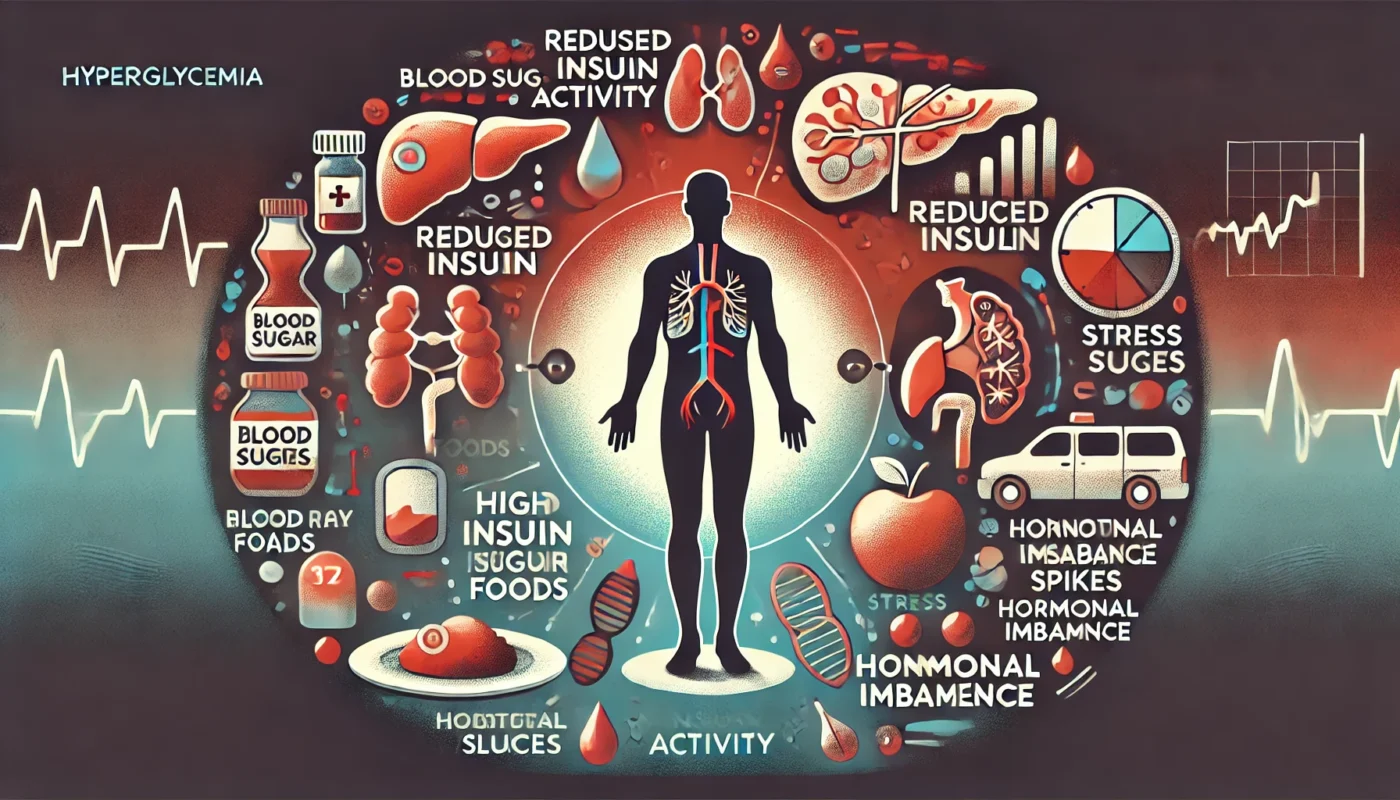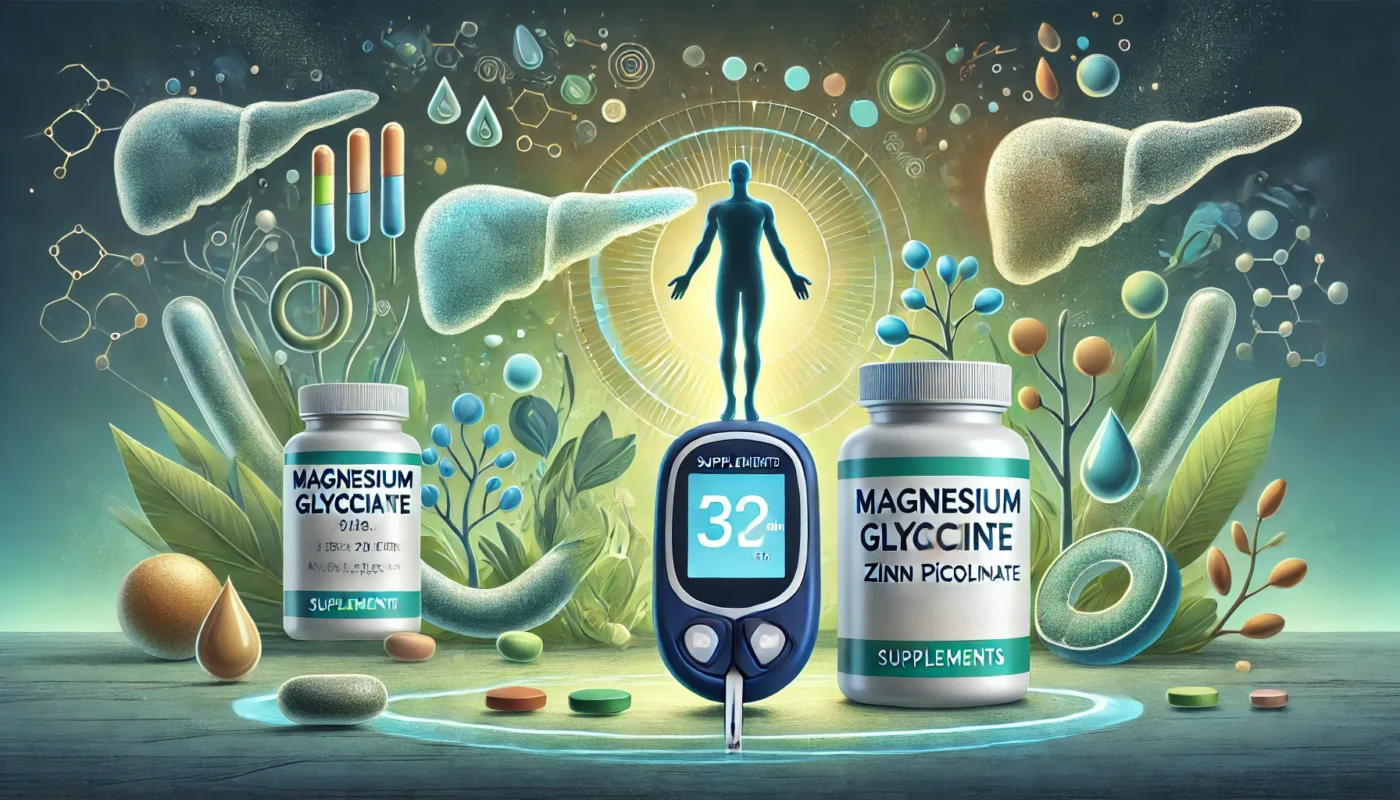Hyperglycemia, defined as elevated blood glucose levels, is a common concern that affects individuals with diabetes and others with metabolic disorders. Chronic hyperglycemia, if left unmanaged, can result in severe complications, including damage to the heart, kidneys, nerves, and eyes. This article explores hyperglycemia in detail, including its symptoms, causes, treatment options, prevention strategies, and the role of nutritional supplementation in managing the condition.
You May Also Like:
What is Hyperglycemia?
Hyperglycemia occurs when blood glucose levels rise above the normal range, typically greater than 125 mg/dL (fasting) or 180 mg/dL (postprandial). Glucose is essential for energy production, but persistently high levels can lead to systemic health issues. While often associated with diabetes, hyperglycemia can also occur in non-diabetic individuals due to stress, illness, or certain medications.
Chronic hyperglycemia is a hallmark of poorly managed diabetes and a significant risk factor for complications, including cardiovascular disease and organ damage. Early recognition and management are crucial for maintaining overall health.
Magnesium Glycinate helps regulate blood sugar levels and supports metabolic health—Order now on Amazon for balanced glucose control!

Symptoms of Hyperglycemia
Hyperglycemia symptoms may develop gradually and include both acute and long-term manifestations. Common signs are:
- Increased Thirst (Polydipsia): Excess glucose in the bloodstream triggers a compensatory mechanism that increases thirst.
- Frequent Urination (Polyuria): The kidneys excrete excess glucose, leading to increased urination.
- Fatigue: Inadequate glucose utilization by cells results in low energy levels.
- Blurred Vision: High glucose levels can cause swelling in the lens of the eye, impairing vision.
- Headaches: Elevated glucose levels may trigger recurrent headaches.
- Unexplained Weight Loss: Despite adequate caloric intake, glucose may not be effectively utilized for energy, causing weight loss.
If untreated, severe hyperglycemia can lead to diabetic ketoacidosis (DKA) or hyperosmolar hyperglycemic state (HHS), both of which are medical emergencies.
Causes of Hyperglycemia
Hyperglycemia arises when the body cannot effectively regulate blood glucose levels. The most common causes include:
1. Diabetes Mellitus
In both Type 1 and Type 2 diabetes, insufficient insulin production or insulin resistance results in elevated glucose levels. According to a 2020 report in Diabetes Research and Clinical Practice, nearly 34 million adults in the United States are living with diabetes, many of whom experience episodes of hyperglycemia.
2. Stress or Illness
Acute stress and infections can elevate cortisol and other stress hormones, increasing glucose production. A 2018 study in The Journal of Endocrinology demonstrated that stress-related hyperglycemia occurs even in non-diabetic individuals during hospitalization.
3. Poor Dietary Habits
Excessive consumption of high-sugar or high-carbohydrate foods can overwhelm the body’s glucose regulatory mechanisms, particularly in individuals with insulin resistance.
4. Lack of Physical Activity
Sedentary behavior reduces insulin sensitivity, making it difficult for the body to regulate glucose effectively.
5. Medications
Certain medications, including corticosteroids, beta-blockers, and some diuretics, can elevate glucose levels as a side effect.
6. Hormonal Imbalances
Endocrine disorders, such as Cushing’s syndrome or hyperthyroidism, can contribute to hyperglycemia by disrupting glucose metabolism.

Treatment Options for Hyperglycemia Recovery
Effective treatment of hyperglycemia aims to reduce blood sugar levels to a safe range and prevent complications. Management strategies include:
1. Adjusting Medications
For individuals with diabetes, insulin doses or oral hypoglycemic agents may need adjustment. A randomized controlled trial published in Diabetes Care (2019) found that intensifying insulin therapy in Type 2 diabetes reduced HbA1c levels and minimized hyperglycemic episodes.
2. Dietary Modifications
Reducing carbohydrate intake and focusing on low-glycemic index foods can help stabilize blood glucose. Incorporating high-fiber foods such as vegetables, legumes, and whole grains further aids in glucose regulation.
3. Increasing Physical Activity
Regular aerobic exercise improves insulin sensitivity and facilitates glucose uptake by muscles. A 2020 study in The Journal of Clinical Endocrinology & Metabolism showed that moderate exercise reduced postprandial glucose levels by 20%.
4. Hydration
Drinking water helps flush excess glucose from the bloodstream. Proper hydration also prevents dehydration, which can worsen hyperglycemia.
Nutritional Supplementation for Hyperglycemia Relief
Nutritional supplements may provide targeted support for individuals managing hyperglycemia. The following supplements have shown promising benefits:
1. Chromium Picolinate
Chromium plays a critical role in enhancing insulin function and improving glucose uptake. A 2021 study in Diabetes Technology & Therapeutics found that chromium supplementation significantly reduced fasting glucose levels and HbA1c in individuals with Type 2 diabetes.
2. Magnesium Glycinate
Magnesium is essential for insulin secretion and glucose metabolism. A clinical trial published in Magnesium Research in 2018 demonstrated that magnesium supplementation improved glycemic control and reduced fasting blood sugar levels in prediabetic individuals.
3. Turmeric (Curcumin)
Curcumin, the active compound in turmeric, has anti-inflammatory properties and enhances insulin sensitivity. A 2019 meta-analysis in Phytotherapy Research found that curcumin supplementation lowered fasting glucose levels and improved lipid profiles in patients with metabolic syndrome.
4. Alpha-Lipoic Acid (ALA)
ALA is a potent antioxidant that enhances glucose uptake and reduces oxidative stress associated with hyperglycemia. A study in Diabetes Research and Clinical Practice (2020) showed that ALA supplementation improved glucose tolerance and reduced insulin resistance.
5. Berberine
Berberine, a plant-based alkaloid, has been shown to reduce glucose production in the liver and improve insulin sensitivity. Research in Metabolism: Clinical and Experimental (2020) highlighted its comparable efficacy to metformin in lowering blood sugar levels.
6. Zinc Picolinate
Zinc supports pancreatic function and insulin secretion. A 2020 study in Journal of Trace Elements in Medicine and Biology found that zinc supplementation reduced fasting blood glucose levels in diabetic individuals.

Steps for Possible Prevention of Hyperglycemia
Preventing hyperglycemia requires consistent lifestyle modifications and proactive management of risk factors. Strategies include:
1. Monitor Blood Glucose Levels
Frequent monitoring helps detect elevated glucose levels early, enabling timely intervention.
2. Adhere to a Balanced Diet
Consume a diet rich in whole foods, including vegetables, lean proteins, and healthy fats. Avoid sugary drinks, processed foods, and refined carbohydrates.
3. Stay Physically Active
Engage in at least 150 minutes of moderate exercise per week, including walking, cycling, or resistance training.
4. Manage Stress
Stress management techniques such as mindfulness, meditation, and yoga can reduce cortisol levels and stabilize blood sugar.
5. Take Medications as Prescribed
Follow the prescribed dosage and schedule for diabetes medications or insulin to maintain stable glucose levels.
6. Avoid Smoking and Excess Alcohol
Smoking and excessive alcohol consumption impair glucose metabolism and exacerbate hyperglycemia.
7. Maintain a Healthy Weight
Achieving and sustaining a healthy body weight reduces insulin resistance and supports glucose regulation.
8. Stay Hydrated
Adequate hydration supports kidney function and helps flush excess glucose from the bloodstream.
9. Regular Check-Ups
Schedule routine healthcare visits to monitor glucose levels, HbA1c, and overall metabolic health.
Conclusion
Hyperglycemia is a complex condition that requires careful management to prevent short-term symptoms and long-term complications. By combining lifestyle changes, medical interventions, and nutritional supplements such as chromium picolinate, magnesium glycinate, and berberine, individuals can achieve better glucose control and enhance overall health. Preventive strategies, including regular exercise, a balanced diet, and stress management, further reduce the risk of hyperglycemia. With consistent efforts and proactive care, individuals can effectively manage hyperglycemia and improve their quality of life.

References
- Effects of zinc supplementation on glycemic control and oxidative stress in experimental diabetes: A systematic review. Retrieved from: https://www.sciencedirect.com/science/article/abs/pii/S2405457722004326
- Insulin Therapy, Hyperglycemia, and Hypertension in Type 1 Diabetes Mellitus. Retrieved from: https://pmc.ncbi.nlm.nih.gov/articles/PMC2701288/
- Oral Magnesium Supplementation for Treating Glucose Metabolism Parameters in People with or at Risk of Diabetes: A Systematic Review and Meta-Analysis of Double-Blind Randomized Controlled Trials. Retrieved from: https://pubmed.ncbi.nlm.nih.gov/34836329/
- Curcuminoids for Metabolic Syndrome: Meta-Analysis Evidences Toward Personalized Prevention and Treatment Management. Retrieved from: https://pmc.ncbi.nlm.nih.gov/articles/PMC9218575/
- Alpha-Lipoic Acid and Glucose Metabolism: A Comprehensive Update on Biochemical and Therapeutic Features. Retrieved from: https://pmc.ncbi.nlm.nih.gov/articles/PMC9824456/
Important Note: The information contained in this article is for general informational purposes only, and should not be construed as health or medical advice, nor is it intended to diagnose, prevent, treat, or cure any disease or health condition. Before embarking on any diet, fitness regimen, or program of nutritional supplementation, it is advisable to consult your healthcare professional in order to determine its safety and probable efficacy in terms of your individual state of health.
Regarding Nutritional Supplements Or Other Non-Prescription Health Products: If any nutritional supplements or other non-prescription health products are mentioned in the foregoing article, any claims or statements made about them have not been evaluated by the U.S. Food and Drug Administration, and such nutritional supplements or other health products are not intended to diagnose, treat, cure, or prevent any disease.

